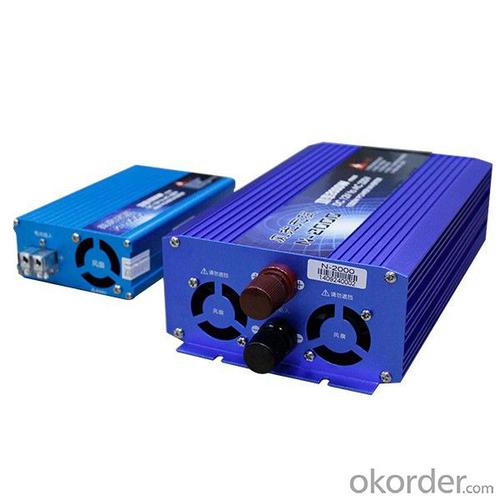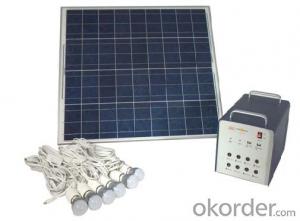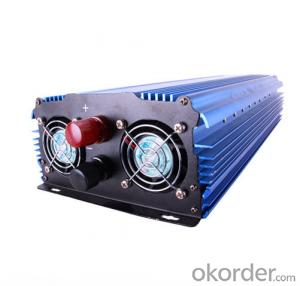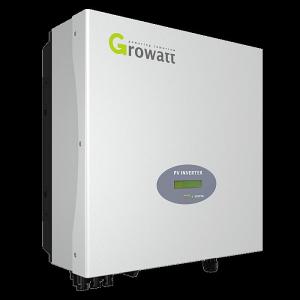Marine Solar Energy Systems Compatible Car Inverter / Home Appliance Reasonable Design Car Inverter 12V 220V
- Loading Port:
- China main port
- Payment Terms:
- TT OR LC
- Min Order Qty:
- 20 carton
- Supply Capability:
- 10000 carton/month
OKorder Service Pledge
OKorder Financial Service
You Might Also Like
Home Appliance Reasonable Design car inverter 12v 220v
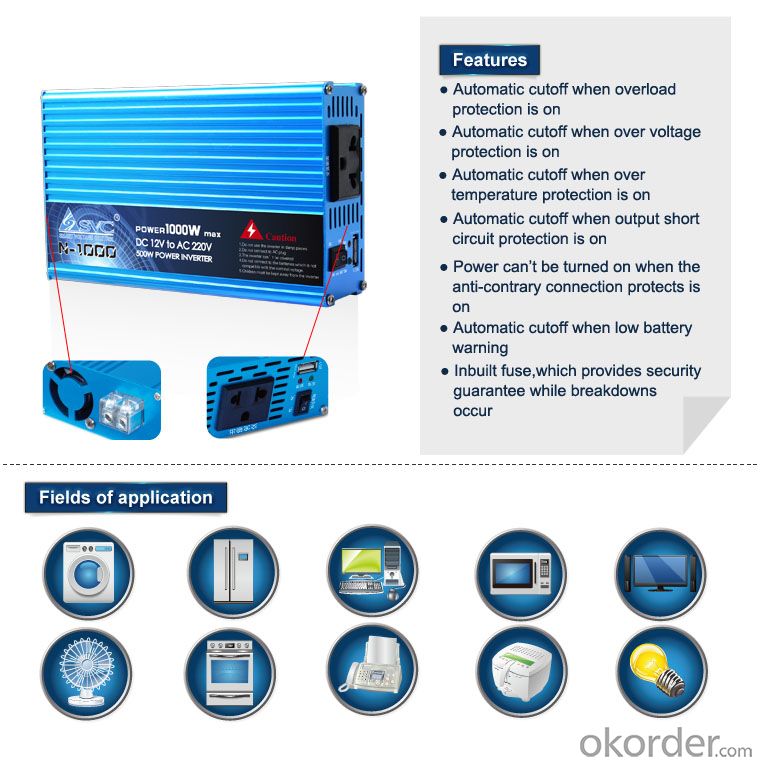
Product introduction
ART-P series, PWM wave and rated power from 300w to 3000w, designed to meet different requirements in the middle market. Power supply by converting DC 12V/24V/48V (for example, batteries of cars, ships and accumulator etc.) to AC 115V/230V, and suitable for electrical equipment less than 3000W (e.g. cellphone, laptop, and solar power system etc.)

| Model | ART-P300 | ART-P500 | ART-P1000 | ART-P2000 | ART-P3000 |
| Rated power | 300W | 500W | 1000W | 2000W | 3000W |
| Max power | 600W | 1000W | 2000W | 4000W | 6000W |
| INPUT | |||||
| Input voltage | 12V/24/48VDc | ||||
| OUTPUT | |||||
| Output voltage | 115V/230VAc(1±5%) | ||||
| Output wave form | PWM | ||||
| Output frequency | 50/60Hz | ||||
| FUNCTION | |||||
| USB Port | 5V 500mA(optional) | ||||
| No-load current | <0.5a< span=""> | ||||
| Efficiency | >90% | ||||
| PROTECTION | |||||
| Protections | overload protection, input overvoltage protection, input under-voltage protection, over temperature protection, Buzzer protection and Intelligent control. | ||||
| PHYSICAL | |||||
| Unit dimension (mm) | 120*100*50mm | 165*100*50mm | 240*155*70mm | ||
| Unit weight (kg) | 0.45(Kg) | 0.60(Kg) | 0.65(Kg) | 1.2(Kg) | 1.42(Kg) |
| Packing details | Color box(20pcs/ctn) | Color box(12pcs/ctn) | |||
| ENVIRONMENT | |||||
| Environment of performance | Temperature 0℃~40℃, Humidity 20%~90% | ||||
| Noise level | Less than 40dB | ||||

Feature
1. Design of aluminum case ensures its excellent cooling abllity and sturdiness, also extending service life.
2. Car cigarette lighter wire and clip wire (optional) for using in car or be used for battery.
3. USB interface (optional); two LED lights for showing the working or protecting status; Button switch to control inverter.
- Q: Can solar energy systems be used for powering electric vehicle solar charging stations at rest areas?
- Yes, solar energy systems can be used to power electric vehicle solar charging stations at rest areas. Solar panels can be installed at these locations to capture sunlight and convert it into electricity, which can then be used to charge electric vehicles. This renewable energy source not only provides a sustainable and environmentally friendly option for charging electric vehicles but also helps reduce reliance on the electrical grid.
- Q: Can solar energy systems be used in areas with limited access to solar junction boxes?
- Yes, solar energy systems can be used in areas with limited access to solar junction boxes. In such cases, alternative methods like micro-inverters or power optimizers can be employed to convert the DC power generated by solar panels into AC power without the need for a central junction box. These decentralized solutions allow for greater flexibility in system design and can be particularly useful in remote or challenging locations where traditional grid-connected systems may not be feasible.
- Q: Are there any limitations to the lifespan of solar energy systems?
- Yes, there are limitations to the lifespan of solar energy systems. The most significant limitation is the degradation of the solar panels over time. Solar panels are made up of photovoltaic (PV) cells that convert sunlight into electricity. These cells degrade gradually, losing efficiency as they age. On average, solar panels experience a degradation rate of around 0.5-1% per year, which means that after 25-30 years, the panels might only produce around 75-80% of their original power output. Another limitation is the lifespan of other components in the solar energy system, such as inverters, batteries (if present), and wiring. Inverters, which convert the DC electricity generated by the solar panels into AC electricity for use in homes or businesses, typically have a lifespan of 10-15 years. Batteries, if used for energy storage, also have a limited lifespan, usually around 5-10 years. Wiring can deteriorate over time due to exposure to the elements, requiring maintenance or replacement. Furthermore, environmental factors can impact the lifespan of solar energy systems. Extreme weather conditions like hailstorms, hurricanes, or heavy snow can damage solar panels, reducing their efficiency or even rendering them inoperable. Additionally, excessive heat can accelerate the degradation of solar panels, shortening their lifespan. However, it is important to note that while solar energy systems have limitations, proper maintenance and regular inspections can help maximize their lifespan and performance. Many solar panels come with warranties that guarantee their performance for a certain number of years, often ranging from 20 to 25 years. Moreover, technological advancements and improvements in manufacturing processes are constantly being made, which may lead to longer-lasting and more efficient solar energy systems in the future.
- Q: Are there any risks of electrical grounding issues with solar energy systems?
- Yes, there are some risks of electrical grounding issues with solar energy systems. One of the main risks is the potential for electric shock. If the grounding system in a solar energy system is not properly installed or maintained, it can lead to a build-up of electrical current in the system. This can result in a person coming into contact with a live electrical component and experiencing an electric shock. Another risk is the potential for fire. If the grounding system is not properly installed, it can cause electrical arcing, which can lead to a fire. This is particularly dangerous in solar energy systems as they are typically installed on rooftops, where a fire can quickly spread to the rest of the building. Additionally, a faulty grounding system can also lead to damage to the solar energy system itself. Without proper grounding, electrical surges and fluctuations can occur, which can damage sensitive components of the system, such as inverters or batteries. To mitigate these risks, it is crucial to ensure that the grounding system of a solar energy system is properly installed and regularly inspected and maintained. This includes using proper grounding equipment, such as grounding rods or conductors, and ensuring that all connections are secure and free from corrosion. Regular testing of the grounding system should also be conducted to ensure its effectiveness. It is recommended to hire a qualified professional to install and maintain the grounding system to minimize the risks associated with electrical grounding issues in solar energy systems.
- Q: How often do solar panels need to be cleaned?
- Solar panels generally need to be cleaned at least once or twice a year to ensure optimal performance. However, the frequency of cleaning can vary depending on factors such as the local climate, amount of dust or debris accumulation, and the tilt angle of the panels. Regular inspections and maintenance can help determine the specific cleaning needs of solar panels.
- Q: Can a solar energy system be installed in a remote location?
- Installing a solar energy system in a remote location is certainly feasible. In fact, solar power proves particularly advantageous for areas without reliable access to an electricity grid. The primary benefit of solar energy lies in its capacity to harness electricity from sunlight, which is accessible everywhere. Be it a secluded village, a mountain cabin, or a research outpost in the middle of nowhere, it is possible to install solar panels and utilize them for power generation. Furthermore, advancements in solar technology have enabled the storage of surplus energy in batteries, ensuring a consistent power supply even during periods of limited sunlight or at night. Consequently, remote regions can now access clean, renewable, and sustainable energy sources, reducing their reliance on fossil fuels and contributing to environmental preservation.
- Q: How do solar energy systems impact the insurance coverage of a home?
- Solar energy systems can impact the insurance coverage of a home in a few ways. Firstly, the installation of solar panels may increase the overall value of the home, which may lead to higher insurance premiums. Additionally, the presence of solar panels on the roof can increase the risk of damage or theft, so homeowners may need to ensure they have adequate coverage for these potential risks. However, some insurance providers offer specific policies or endorsements to cover solar panels, which can help protect homeowners from any potential losses or damages associated with their solar energy system.
- Q: Can solar energy systems be used in areas with limited access to healthcare?
- Yes, solar energy systems can certainly be used in areas with limited access to healthcare. Solar energy can power medical equipment, refrigeration systems for vaccines and medicines, lighting in healthcare facilities, and even provide electricity for telemedicine services. Implementing solar energy systems in such areas can help overcome the lack of reliable electricity supply, thereby improving healthcare access and delivery.
- Q: Can solar energy systems be used for powering off-grid water treatment plants?
- Yes, solar energy systems can be used to power off-grid water treatment plants. Solar panels can be installed to generate electricity which can then be used to power the various components and equipment required for water treatment, such as pumps, filters, and disinfection systems. This provides a sustainable and environmentally-friendly solution for powering water treatment plants in remote and off-grid locations where access to the electrical grid is limited or non-existent.
- Q: Can solar energy systems be used in areas with limited sunlight hours?
- Yes, solar energy systems can still be used in areas with limited sunlight hours. While the efficiency of solar panels may be reduced in such areas, advancements in technology have made it possible to generate electricity even in low-light conditions. Additionally, energy storage systems can be employed to store excess energy produced during periods of higher sunlight, allowing for a steady supply of electricity even during limited sunlight hours.
Send your message to us
Marine Solar Energy Systems Compatible Car Inverter / Home Appliance Reasonable Design Car Inverter 12V 220V
- Loading Port:
- China main port
- Payment Terms:
- TT OR LC
- Min Order Qty:
- 20 carton
- Supply Capability:
- 10000 carton/month
OKorder Service Pledge
OKorder Financial Service
Similar products
Hot products
Hot Searches
Related keywords



